Sustainable Transformation Requires New Culture to Stick

Making a sustainable transformation is very seldom successful without also addressing cultural aspects. It often requires new values, norms and changed behaviors by everyone; the Company Board, the CEO and all the employees – and it needs to start from the top. To not consciously be aware of the importance of a new culture and adequately handle it to make it stick is to set up a change effort for failure.
A company wanting to take a major leap within its current domain or take a new direction cannot do this only by taking a system modification approach, like addressing the company’s strategies, processes, competences, products and services. There is also a need for a fundamental change in mindset and behavior relating to such aspects as marketplace, customer relations, and internal cooperation.
The likelihood of falling back into old habits is almost 100% if the cultural perspective is not addressed. The change will not stick and money and time spent will be wasted. Furthermore, employees will get frustrated and new change initiatives will be harder to implement.
Does my change effort affect Company Culture?
The simple answer is that cultural aspects such as norms and behaviors always need to be considered in a change effort. Every case is unique, based upon the company’s situation – its legacy, ambition, and nature of its employees – and needs to be treated accordingly.
For a limited change, affecting only a limited number of people’s behavior, it might just be a case of monitoring the change being implemented, for example ensuring that a new working process is followed.
For a substantial change, a transformation, where there are new approaches to the market, customer, or internal ways of working, substantial effort needs to be put into establishing new values, norms, and behaviors.
How to make it happen?
For a transformation to happen and stick, a lot of attention and perseverance are required from the Board and the Management Team.
Two key questions to consider for the Board and the Management Team before starting a company transformation are:
- Do we have the right talent and skills in the right seats?
- Does the culture need to change?
Since the CEO has a great impact on the change-process, the board must make sure that the CEO understands, has the tools and is ready to undertake transforming the company culture. The board and CEO need to be prepared and discuss the risks involved with the change effort.
Additionally, during the transformation execution phase, the Board needs to ensure that the transformation has the right governance and is progressing in the intended direction.
For the CEO and the Management Team a lot of focus needs to be given not just to changing current norms and behaviors to the new desired ones – but to ensuring that the change is correctly incentivized. People do not change just because you tell them to. They change because they are motivated to do so. Forcing people to change is not a good recipe for a sustainable change. Here are a few simple tips:
- Recognize that culture matters
- Plan for how to change the culture
- Communicate frequently
- “Walk the talk”. Lead by example
- Monitor people’s “true” attitudes and actual behavior
- Be open for course correction
- Consider the culture changes to be “ready” when the new culture sits “in the walls”
A transformation needs a new mindset, full commitment, attention and substantial effort to implement and make stick – but it will pay off when you get it right. Numerous studies have repeatedly shown that companies with a strong culture substantially outperform their competition.
And as renowned management consultant Peter Drucker once remarked, “culture eats strategy for breakfast”.






